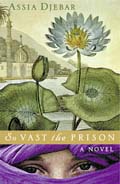
So Vast the Prison
by Assia Djebar
ISBN 1 876631 38 4
$20.95
Publication date: April 2002
"For a long time I believed that writing meant dying..." begins
this extraordinary book, the double-threaded story of one woman's existence
set against he unforgiving history of her country. So Vast the Prison
is the most ambitious work to date by the woman many consider to be North
Africa's most important literary voice. The tragedies of Algerian history
are its subject, and particularly the condition of women in Islam. Djebar's
fiction, like that of Nadine Gordimer and Edna O'Brien, wrestles with
issues of oppression and the subtle ways language and history enforce
it.
So Vast the Prison tells the story of a modern, educated Algerian woman, raised in the years of Colonial oppression and the Algerian War, whose older brother was imprisoned in France. She watches her marriage disintegrate in a society intolerant of women, even as she marvels at the closeness of women among themselves at the ritual baths and in other gatherings. Woven into the woman's personal life story is the ancient history of her land, including the loss of its early languages, the massive destruction suffered in wars of conquest, and the quirks of chance which enabled traces to remain.
A radically singular voice; a private tale, embedded in a vast tapestry.
"From time to time, we hear about books that
supposedly tear away the veil from the lives of Arab women. I don't know
anyone who has done this with more intelligence and passion...than Assia
Djebar. That murmur beneath her images soon begins to sound like a roar."
- Alan Cheuse on National Public Radio's All Things Considered
"She is a teller of many stories, and even within he frame of the
same book, of many different kinds of story, ranging heterogeneously,
though always coherently, over complex worlds of memory and desire."
- The Times Literary Supplement
"As an arrow of silence, this polymorphous lyrical novel by a
woman whose fiction, poetry and films have won her acclaim as Algeria's
foremost literary voice, penetrates many layers of storytelling."
- Los Angeles Times Book Review
|
|
||||
|
|
Email Duffy and Snellgrove | |||
|
|
||||